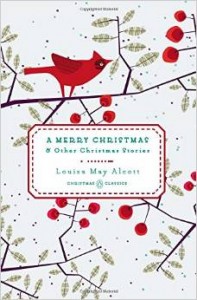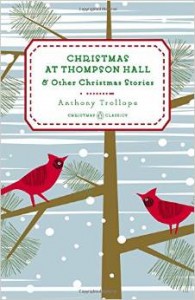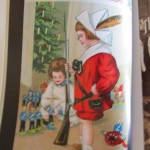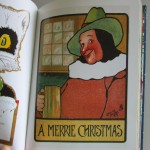A (very special) Christmas Crime Story
Three Days Until Christmas
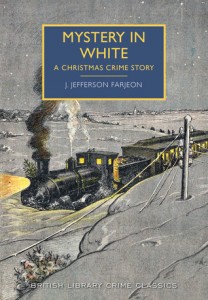 Mystery in White by J. Jefferson Farjeon
Mystery in White by J. Jefferson Farjeon
Get yourself a cup of tea, this is a long story. Back in my college days, I spent several consecutive semesters living and working in the highlands of Scotland (that’s a whole other story). At a local church rummage sale, I came across a beat up old paperback — I think it cost me 10P. This snowy Christmas-time mystery got me through several icy evenings in my digs on the top floor of a frigid stone landowner’s manor, which lacked any sort of central heating. I cuddled under my eiderdown with a hot water bottle (and yes it was a real eiderdown) and read several evenings away. I was due to go home soon, homesick and looking forward to celebrating the holidays with my loved ones.
I lugged that poor paperback back to the states, and would re-read it with my other Christmas books until it had to be rubber banded together to prevent the pages from falling out. During one of my moves, the rubber band broke, random pages went missing and I lost the back cover. Then several years ago in a fit of “this is ridiculous” I tossed it in the recycling bin – the poor thing wasn’t even fit for my donation box. I sometimes remembered this 1930’s classic crime story that kept me mesmerized when I could barely feel my fingers while reading.
So what to my wondering eye should appear but the new British Library Crime Classics reprint series and there it was – my book! Mystery in White – A Christmas Crime Story – all gussied up and sporting a fabulous new cover. I was on Amazon and hitting checkout before I could even take a breath. Originally published in 1937, Mystery in White apparently went out of print and is now republished as part of this new series. (Check out the series for the retro covers alone.) The author is not as well known as many others of the Golden Age yet he was popular in his day. From the book cover:
On Christmas Eve, heavy snowfall brings a train to a halt near the village of Hemmersby. Several of the passengers take shelter in a deserted country house, where the fire has been lit and the table laid for tea – but no one is at home.
Trapped together for Christmas, the passengers are seeking to unravel the secrets of the empty house when a murderer strikes in their midst.
I’m only halfway through my new edition, I keep stopping to marvel at its new incarnation, but I remember this is a surprisingly unusual crime story. While the language is typical of the 1930’s Golden Age and despite its classic situation (strangers-stranded-in-a-blizzard) Mr. Farjeon gives us mysticism, unexpected plot twists, a hapless police inspector who arrives too late to solve the crimes, a dose of romance and chuckle-worthy Noel Coward humor. Some of the situations strain credibility – how do they see the stranded car at night without flashlights? and why does no one seem wet or cold after thrashing about outside in the blizzard? But you’ll soon forget those little reality fails because this is a clever mystery with a snowy Christmas setting that’s sure to keep you warm and happy.
I found an image of the original hardback edition. My paperback had the same cover. 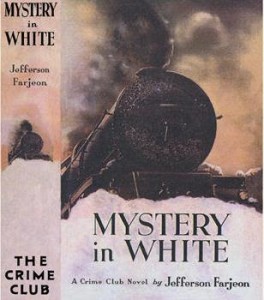
Not a book – but Love Actually
 Four Days Until Christmas
Four Days Until Christmas
For my countdown to Christmas I’m going to add my favorite holiday film. OK you precise people, I admit it’s not a book, but every year, I bring out my cherished DVD to watch it yet again. (My husband just groans, rolls his eyes and goes to the den.)
In case you’ve been living in Kazakhstan, and are unaware of this film, let me explain. Love Actually follows the lives of eight very different couples all immersed with love in various forms. These loosely interrelated tales are set during a frantic month before Christmas in London.
Love Actually has a superb cast, including Bill Nighy as an aging rock star, Emma Thompson as a heartbroken wife, Hugh Grant is the Prime Minister (I know!), Laura Linney, a lonely woman with a secret crush, and Liam Neeson as a sad widower raising his young step-son (oh Liam, I could so cheer you up) .
The romantic entanglements range from comic — to charming — to heartbreaking; a couple fall in love while working in the porn film industry as stand-ins, another couple are unable to communicate given language barriers, and a married couple face an extramarital enticement. And with Hugh Grant as Prime Minister there’s plenty of giggles. Oh, and as a an added bonus, the soundtrack is delightful.
Try and see the film in its original uncut for TV form (cable or Netflix) but if not, Love Actually will undoubtedly come around as a holiday TV movie, so don’t miss it. I dare you not to choke up during the final montage of airport scenes set to the Beach Boys music.
Trailer HERE
What is your favorite holiday film?
Christmas with Alcott and Trollope
Five Days Until Christmas
The newest additions to my Christmas library – purchased for myself at The Booksmith, one of my favorite San Francisco independent bookstores. This store has intriguing events, one of which I have yet to attend — their six times a year $25 open bar & book swap (tempting, oh so tempting – Melinda you in?).
I know quite a shock, me buying more books — but let’s change the subject…shall we?
I don’t own either of these story collections (see? I needed these) and while I know I’ll enjoy Louise May Alcott, I’ve always had trouble reading Trollope. Maybe this small volume will get me over the Trollope hurdle and onto his other works. My grandfather’s book collection includes Barchester Towers and it’s such a lovely edition I would so like to get past the first chapter. Maybe now I will. (Can we say rationalization?)
These are sublime little volumes — beautifully designed—with foil-stamped jackets, decorative endpapers, and vintage nameplates.
They’re part of Penguin’s Christmas Classics series, they’ll publish only a few each year…here’s this year’s list.
- A Christmas Carol by Charles Dickens
- Christmas at Thompson Hall: And Other Christmas Stories by Anthony Trollope
- A Merry Christmas: And Other Christmas Stories by Louisa May Alcott
- The Night Before Christmas by Nikolai Gogol
- The Nutcracker by E. T. A. Hoffmann
I’m proud I limited myself to only two from the list. I came very close to also owning the Nutcracker, but I pulled my errant hand back just in time.
Dickens, of course
 6 Days Until Christmas
6 Days Until Christmas
A Round of Stories by the Christmas Fire by Charles Dickens
From the frontpiece:
Published in its entirety for the first time since 1852, this shining collection of Christmas tales was originally selected by Charles Dickens for his periodical “Household Words”. Each story varies in theme and tone, with scenes of romance, theft, justice, and heart-warming family reunions set alongside haunting tales and chilling ghost stories, while topics addressed range from the meaning of Christmas to disability and race. Contributing authors include Elizabeth Gaskell, Edmund Saul Dixon, Edmund Oliver, and of course Dickens himself, making this a brilliant example of Victorian storytelling and an insightful reflection on the holiday season during the 19th century.
################################################
Dickens was editor of Household Words – a very popular Victorian periodical, with sales at the time in the six figures (wow!). Dickens often commissioned his favorite authors to impersonate an event and write short story installments from different perspectives. In these stories (published as a 1852 Christmas supplement issue) Dickens had each of the authors take on an imaginary role in an extended Victorian family and its servants. Utilizing these various voices from very different classes, the tales are presented in the age old tradition of round-robin style before a roaring fire – sometimes the characters even address one another (which I found delightful).
I will say this is no Hallmark card and these tales are often quite un-Christmasy — from an accidental murder, to ghosts and the mistreatment of a maid. But this being Dickens – there is always uplift and hope within each tale and the storyline, despite being written by different authors, compels the reader to the next narrator.
Because this is the Victorian period (and the often pedantic Dickens), the writing can be a rough road for a modern reader. As in this example from the beginning of Dickens first story entry:
He was very reluctant to take precedence of so many respected members of the family, by beginning the round of stories they were to relate as they sat in a goodly circle by the Christmas fire…
I promise you’ll eventually get in the cadence of the writing but it does take some concentration and perseverance. It is well worth the effort. This is a wonderful view into the Victorian era – where life was hard but hope and charity were steadfast.
Holiday Graphics Gone Wrong
 7 Days Until Christmas
7 Days Until Christmas
This is a collection of reproduced vintage holiday graphics which I bought used at the Friends of the SF Public Library bookstore (where I volunteer). My plan was to cut it up for holiday package tags, but once I turned the pages, I realized it had to stay intact and part of my holiday book collection.
Let me show you why. OK, front cover looks innocent, what could go wrong with “Vintage Holiday Graphics”?
(Click to view larger)
 Back cover — still fairly innocuous.
Back cover — still fairly innocuous.
But upon further investigation….
There’s creepy Santa
Then there’s stalker Santa
Awkward family Christmas photos
Festive pasta holiday decorations
Armed children.
Holiday advertising, because what could be a better gift than a new thermos?
Obviously Santa enjoys a drink or two
As do the villagers.
Finally, a charming book of matches, perfect for enticing the little ones to burn down the house.
See why I couldn’t cut this book up? I leave it out every year for unsuspecting visitors…who pick it up and inevitably say “What the ___ ?”
The Christmas Letters by Lee Smith

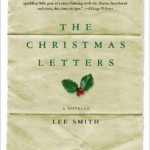 8 Days Until Christmas
8 Days Until Christmas
By now you know of my fondness for epistolary novels and when it involves Christmas letters – well, all the more enticing. I’ve read this book almost every year since I received it as a gift from my friend Jane. Turns out my copy (left) is a first edition and the cover was changed with subsequent editions (right).
Lee Smith is a Southern writer, most famous for Fair and Tender Ladies (add that one to your list) who writes compelling family sagas without slobbering or being sticky sweet.
This novella tells the life stories of several generations of women through their family letters at Christmas. The women write of their struggles to cope with the hardships each generation is given–a husband off in WWII, a damaged Viet Nam veteran, divorce, loss of a parent, a child leaving home and the fate of being handed a life you can’t fathom but try to accept.
Not your typical “feel good” Christmas story – this is real life, messy and unforgiving, but still filled with love and family ties. And it includes recipes – each woman shares what she has tried cooking and writes out how she prepared the dish. The dishes range in time period, a simple custard during WWII to the novelty of processed food in the sixties, and then a back-to-the-earth vegetarian recipe. Nicely, the talk of food in the letters set the tone without overpowering the story — when the Southern grandmother takes her first bite of a bagel, she exclaims “Whoever thinks this is good has never had a biscuit!”.
The ending leaves a big question making me wonder if Ms. Lee had plans to continue the saga – but sadly there have been no sequels.
Excerpted from the back cover:
Dear Friends,
Like me, you probably get Christmas letters every year. I read every word and save every letter. Because every Christmas letter is the story of a life, and what story can be more interesting than the story of our lives? Often, it is the story of an entire family. But you also have to read between the lines with Christmas letters. Sometimes, what is not said is even more important than what is on the page.
I wrote this little book for the same reason I write to my friends and relatives every holiday–Christmas letters give us a chance to remember and celebrate who we are.
With warmest greetings, Lee Smith
The book is a lovely quiet holiday read, and it holds its standing as one of my favorite Christmas books to re-read each season, to remind me of what I hold dear about the holidays, the embracing of loved ones, good cheer and charity.


